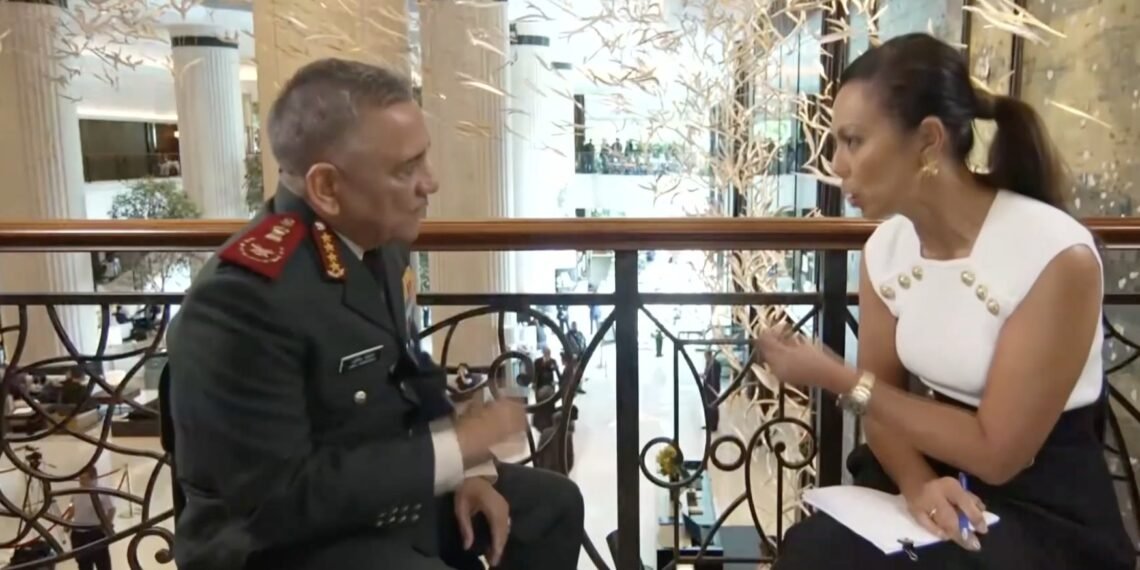India says nuclear weapons were never seriously considered during Operation Sindoor offensive against Pakistan, calling talk of atomic escalation “far-fetched.”
BY PC Bureau
New Delhi – India’s Chief of Defence Staff, General Anil Chauhan, has publicly acknowledged for the first time that the Indian Air Force lost fighter jets during the recent four-day conflict with Pakistan, though he declined to reveal specific figures.
Speaking at the Shangri-La Dialogue in Singapore on Saturday, General Chauhan described the losses as part of a broader learning experience for the Indian military. “It’s not about how many jets went down,” he said in an interview with Bloomberg TV. “What matters is understanding why they were lost, what mistakes were made, and how we corrected them.”
READ: Manipur: BJP MLAs Call for Neutral Peace Envoy, Dialogue
The conflict, which erupted on May 7, marked the most serious escalation between the nuclear-armed neighbors in over 50 years. It followed a deadly terror attack in Jammu and Kashmir on April 22 that left 26 civilians dead—an act India attributed to Pakistan-based militants. Islamabad denied involvement.
CDS Gen. A. Chauhan admits IAF losses, May 7
At Shangri-La Dialogue
Denies Pak claim of 6 jets down but does not specify how many, says tactical mistake corrected and jets again went into action 2 days later hitting at long-range
(Assessment is that atleast 4 went down) pic.twitter.com/b1dKwSYVY4
— Vikram Jit Singh (@VJSWRITER) May 31, 2025
While Pakistan’s Prime Minister Shehbaz Sharif claimed earlier this month that six Indian jets were shot down, General Chauhan dismissed the claim as “absolutely incorrect” but stopped short of providing India’s own tally. “Numbers are not important,” he repeated, emphasizing that India quickly adapted its tactics and resumed long-range precision strikes just two days after the initial losses.
Indian forces reportedly conducted deep strikes on heavily fortified Pakistani airbases, targeting locations as far as 300 kilometers inside Pakistan with meter-level precision. General Chauhan highlighted this capability as evidence of India’s operational resilience and technological superiority.
READ: India Grapples with COVID Surge: Maharashtra, Delhi, Kerala See Sharp Spike
Responding to concerns about the possibility of nuclear escalation, General Chauhan said there was no serious threat of atomic warfare during the conflict. He dismissed former U.S. President Donald Trump’s claim that American intervention had helped avert a nuclear crisis as “far-fetched.”
“I personally believe there is ample space between conventional warfare and the nuclear threshold,” Chauhan stated. He added that communication channels between India and Pakistan remained open throughout the conflict to prevent uncontrolled escalation.
The Defence Chief also dismissed the effectiveness of foreign-supplied weapon systems used by Pakistan during the hostilities, particularly those from China. An Indian government-backed research body recently alleged that China had provided Pakistan with satellite and air defense support during the conflict.
READ: Missing Arunachal Anti-Dam Activist Ebo Mili Resurfaces
Despite these external reinforcements, Chauhan claimed Indian forces maintained the upper hand. “Their systems didn’t work,” he said. “We achieved precision targeting despite heavy air defenses.”
As the region remains tense but calm, Chauhan warned that future peace would depend on Islamabad’s conduct. “We have laid down clear red lines,” he said. “The continuation of the ceasefire will hinge on Pakistan’s willingness to respect them.”
Congress Reacts: Reacting to the revelation made by General Chauhan, Congress leader Jairam Ramesh pointed out that on July 29, 1999, the Vajpayee Govt set up the Kargil Review Committee under the chairmanship of India’s strategic affairs guru K. Subrahmanyam – whose son is now our External Affairs Minister. This was just three days after the Kargil War had ended, he said.
” This Committee submitted its detailed report five months later. The report titled ‘From Surprise to Reckoning’ was then laid on the Table of both Houses of Parliament on Feb 23, 2000 after the necessary redactions. Will the Modi Govt now take a similar step in light of what the Chief of Defence Staff has just revealed in Singapore?”, he asked.














